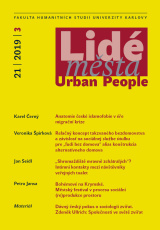Bohémové na Krymské.
Městský festival v procesu sociální (re)produkce prostoru
DOI:
https://doi.org/10.14712/12128112.3236Klíčová slova:
gentrification, neo-bohemia, festival, social production of space, media analysisAbstrakt
This case study describes the transformation of Krymská Street in terms of commercial gentrification as a social (re)production of space. It focuses on the commercial gentrification of a deprived district in the capital of the Czech Republic, and defines the present-day gentrifiers, the local self-employed entrepreneurs, as the Neo-bohemians. The study focuses on the specific role of the do-it-yourself Korso Krymská Festival in this transformation, arguing that the festival, as a type of representational space, reflects and reproduces the ways of using the public space of Krymská Street. In this study, Lefebvre’s concept of the social (re)production of space serves to conceptualise the role of Korso Krymská as the most distinctive spatial practice of local entrepreneurs, as well as a space directly lived through its associated images and symbols, reflecting the local neo-bohemian ideals. The spatial practices of the festival and the interaction within the space of the street through the imagination that seeks out the change and appropriation of said space have been taken over by the media. The media has also created abstract concepts that represent the space of Krymská Street and influence the street spatial practice in the context of everyday life. As a result, the festival and its media image have become an intensifier of the dislocation pressure on long-term residents rather than being the initially intended tool for building a community-based neighbourhood. The festival as a representational space also reflects the contradictory relationship of local entrepreneurs to Krymská Street, which is characterised by a blurring border between their business interests and the declared production of a community space that is presented primarily as the public interest of the neighbourhood.
Stahování
Publikováno
Jak citovat
Číslo
Sekce
Licence

Tato práce je licencována pod Mezinárodní licencí Creative Commons Attribution-NonCommercial-NoDerivatives 4.0.


